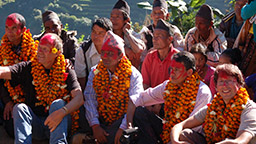Japonsko, Norsko, Nepál, 2015, 89 min
F. Storaas, D. Kharel
28.01.2017 18:55
 In Okharbot village of Western Nepal a few persons still know the age-old traditional practise of mining, smelting and casting of copper. The copper has a number of symbolic meanings and economic aspects connected to exchange and healing properties, as well as being the Hindu god Shiva. The complex caste system of Nepal, although abolished, still structures the lives of most people. The untouchable smiths, the Kami, produce one of the purest metals in Hindu cosmology. The film follows Ujir, the foreman, who guides the steps of the mining and smelting. During the smelting work the festival of Dassain took place in the village. The festival is part of the social and cultural context presented in the film along with the traditional smelting process of copper.
In Okharbot village of Western Nepal a few persons still know the age-old traditional practise of mining, smelting and casting of copper. The copper has a number of symbolic meanings and economic aspects connected to exchange and healing properties, as well as being the Hindu god Shiva. The complex caste system of Nepal, although abolished, still structures the lives of most people. The untouchable smiths, the Kami, produce one of the purest metals in Hindu cosmology. The film follows Ujir, the foreman, who guides the steps of the mining and smelting. During the smelting work the festival of Dassain took place in the village. The festival is part of the social and cultural context presented in the film along with the traditional smelting process of copper.
Dipesh Kharel is an independent documentary filmmaker from Nepal about to finish his PhD research in film and social anthropology at the University of Tokyo in Japan. He received a Master of Philosophy in documentary film studies from the University of Tromsø in Norway.
Frode Storaas is a professor of visual anthropology at the University Museum of Bergen, Norway. His anthropological research has mainly been with pastoralists in Eastern Africa. A theme conveyed in many of his films has been how cultural traditions and ideas influence everyday life. Storaas is gen.sec. of NAFA, a worldwide network for visual anthropology, and the NAFA collection of anthropological films.
Director, camera, script, edit: F. Storaas, D. Kharel
Production: University Museum of Bergen, Norway, Media Help Line, Nepal
Festivals (selection): 2015 Nepal Panorama, Best Documentary; 14th RAI INTERNATIONAL FESTIVAL OF ETHNOGRAPHIC FILM, Watershed in Bristol, England 2015
Language of Subtitles: Nepalese
Language of Dialogues: English, Czech
